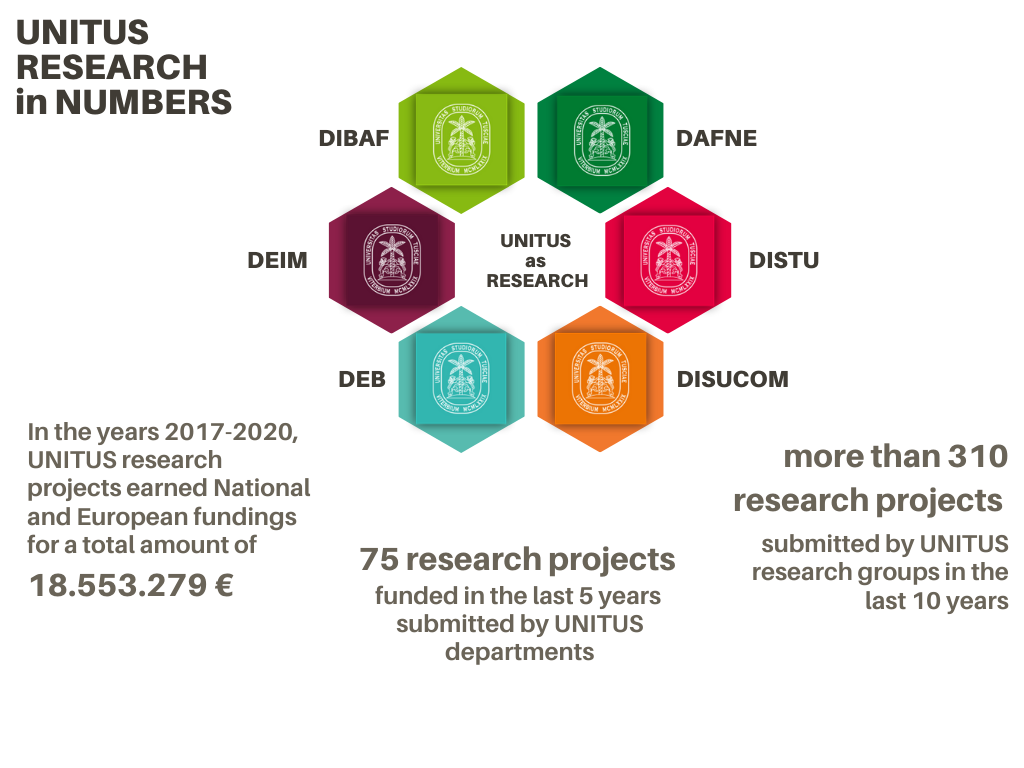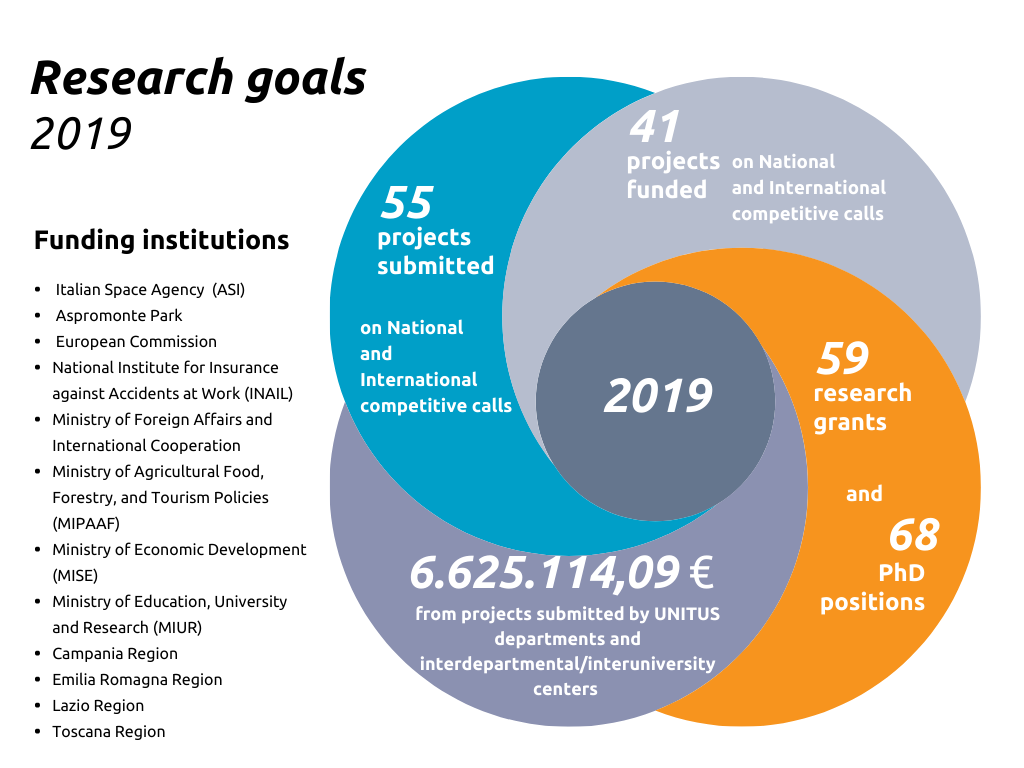Tuscia University supports the central role of research for the advancement of knowledge and for the achievement of objectives with significant scientific, cultural, social and economic interest. In this sense, UNITUS recognizes research as a primary function, guaranteeing its development as well as the essential connection with teaching.
Furthermore, UNITUS promotes technology transfer, patenting, entrepreneurship support for the creation of start-ups and spin offs, and it is proactively involved in the issues of research evaluation, support for innovation and university responsibility in order to generate social and economic impact on the territory.
In this perspective, a significant position achieved by University research is represented by the admission of 3 of the six UNITUS departments to the Project for Departments of Excellence envisaged by law 232 of 2016 (2017 budget law), which aims to finance the best 180 departments of state universities.
For the University of Tuscia, the following departments of excellence have been appointed:
- Department of Agricultural and Forestry Sciences (DAFNE)
- Department for Innovation in Biological, Agri-food and Forestry Systems (DIBAF)
- Department of Linguistic-Literary, Historical-Philosophical and Legal Studies (DISTU)

Among the structural specifics of the University of Tuscia, in addition to the Departments and Interdepartmental-Interuniversity Centers, UNITUS is directly involved into 4 noteworthy National Technological CLUSTERS through its teaching and technical-administrative staff.
National Technological Clusters are networks of public and private entities operating on the national territory in fields such as industrial research, training and technology transfer. They act as resource catalysts to meet the needs of territory and market, coordinate and strengthen the connection between research and businesses.
Technological clusters in which UNITUS participates are listed below:
- SPRING - Sustainable Processes and Resources For Innovation and National Growth, the 4 technical-scientific departments are involved: DAFNE, DEB, DEIM, DIBAF. The referent of the SPRING Cluster is Prof. Raffaele Saladino. The SPRING cluster brings together innovative subjects for the development of the whole green chemistry chain in order to arrive at a new economy (Bioeconomy). The goal is helping to create the conditions for the development of an attractive, dynamic, innovative, competitive and continuously growing industrial and academic context and fabric.
- BIG - Blue Italian Growth, involving DAFNE, DEB and DIBAF departments; the contact person of the BIG Cluster is Prof. Giuseppe Scapigliati. BIG cluster is focused on the development and consolidation of the national technological cluster in marine economy, according to what is defined by the National Research Program 2015-2020, approved by CIPE with resolution of May 1st 2016, aimed to generate, at the intersection of public and private research, opportunities for technological and innovative development for Italian marine and maritime industrial system.
- TICHE - Technological Innovation in Cultural Heritage, involving DISUCOM, DISTU, DIBAF and DEIM departments; the referent for TICHE Cluster is Prof. Giovanni Fiorentino. Main topics approached are related to the development of a technological cluster in the field of Technologies for Cultural Heritage.
- CLAN - National Agrifood Cluster, involving DIBAF and DAFNE departments; the head of the CLAN Cluster is Prof. Stefania Masci. The Cluster is devoted to promote and facilitate industrial research, innovation, pre-competitive development and training in the national agri-food field, also providing for specific interventions to support the southern areas.
A solid contribution to UNITUS research purposes comes from the involvement of doctoral students in study, research and laboratory activities. In 2019, a total of n. 68 PhD positions have been funded. Forty-five candidates obtained the PhD title in the calendar year 2019 in the 7 doctoral courses formally recognized and active at the University of Tuscia. The PhD courses aim to provide the skills necessary to carry out highly qualified research activities in research centers, universities and industrial and service companies, as well as to undertake qualifying paths in the exercise of the liberal professions, in public services and private business, in the public administration and to promote innovative entrepreneurial skills.
UNITUS has achieved excellent results on National and International competitive calls. Since the launch in 2014 of HORIZON2020, the European Union framework program for research and innovation, the University of Tuscia has obtained almost 4.5 million euros of European funding for competitive research. The University of Tuscia thus ranks first among small state universities (up to 10,000 students) in Italy in terms of attracting funds from Europe.
